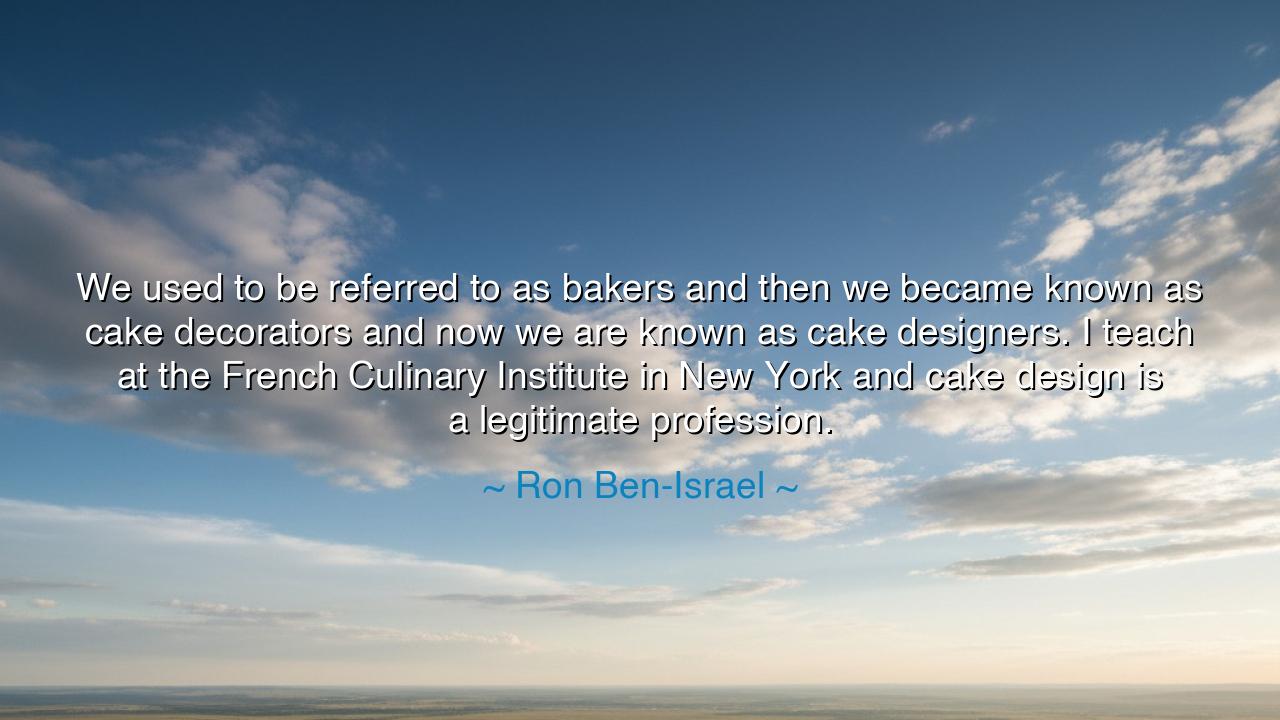
We used to be referred to as bakers and then we became known as
We used to be referred to as bakers and then we became known as cake decorators and now we are known as cake designers. I teach at the French Culinary Institute in New York and cake design is a legitimate profession.






The words of Ron Ben-Israel — “We used to be referred to as bakers and then we became known as cake decorators and now we are known as cake designers. I teach at the French Culinary Institute in New York and cake design is a legitimate profession.” — reveal a truth far greater than the art of pastry. They tell the story of evolution — of craft transformed into art, and of labor elevated into legacy. In his words lives the eternal human journey: the rising of the humble into the sublime. For what once was considered simple sustenance — bread, sugar, flour — has become a medium of beauty, imagination, and cultural expression. This transformation is not merely about cakes, but about the dignity of creation and the courage to reimagine what the world deems ordinary.
In the ancient world, every true craft was revered as sacred. The sculptors of marble were not mere workers of stone — they were believed to channel divine inspiration into form. The potters who shaped clay were seen as imitators of the gods, molding life from dust. And so, in our time, the baker who becomes a designer continues that ancient lineage. He takes what is perishable — sugar, butter, flour — and gives it meaning, structure, emotion. When Ron Ben-Israel declares cake design to be a “legitimate profession,” he is not demanding recognition; he is proclaiming that beauty born from devotion deserves reverence, no matter the medium.
This journey from “baker” to “designer” mirrors the evolution of all artistry. Consider Leonardo da Vinci, who began as an apprentice in Verrocchio’s workshop, mixing paints and polishing marble. In the eyes of the world, he was a laborer. Yet through vision and persistence, he transformed that labor into genius, until his brush became an instrument of revelation. Likewise, the baker who once followed recipes now dreams of architecture in sugar and color — turning craft into vision, and skill into poetry. In this transformation, we see the universal truth that the hand that serves can also create, and the mind that toils can also dream.
Ben-Israel’s rise reflects not only personal mastery but also the changing consciousness of society. In ages past, the craftsman’s name was forgotten while kings and patrons were remembered. But today, we begin to see that the true nobility of human culture lies in the maker, not the ruler. The cake designer, like the painter or sculptor, tells stories of love, celebration, and art through form and flavor. To dismiss such a creator as “just a baker” would be as foolish as calling Michelangelo “a stonecutter.” What Ben-Israel defends, then, is not only a profession — it is the right of the artist to be seen as an artist, regardless of what tools he uses.
There is also humility in his declaration. By tracing the journey from “baker” to “decorator” to “designer,” he acknowledges that growth is a process of identity — a continual redefinition of what we are capable of. In every craft, this transformation occurs: the carpenter becomes an architect, the writer becomes a philosopher, the musician becomes a composer. The same hands that once shaped dough now shape dreams. Through perseverance, what was once dismissed as mere work becomes art that touches the spirit. This, too, is a lesson for every soul: never allow the world to define the limits of your craft. What begins as labor may end as legacy.
History offers many who, like Ben-Israel, elevated the humble into the noble. Auguste Escoffier, the father of modern cuisine, transformed the chaos of kitchen labor into culinary philosophy. He saw in the chef’s work not mere feeding, but artistry in flavor and form. Likewise, Ben-Israel brought to the art of cake what the ancients brought to sculpture — precision, passion, and the pursuit of beauty. His teaching at the French Culinary Institute is not simply about sugar and fondant; it is a continuation of humanity’s oldest calling — to make beauty where once there was none.
Thus, the lesson of his words transcends the kitchen. Whatever your craft — whether you shape metal, write words, heal the sick, or raise a child — see your work as design, not duty. Infuse it with imagination, patience, and love. Do not accept the titles the world gives you; redefine them through mastery. For every act of creation, no matter how small, is a declaration of the divine spark within you. And when you perfect your craft — when you lift it from the realm of the necessary to the realm of the beautiful — then, like Ron Ben-Israel, you will have proven that art is not a gift reserved for the chosen few, but the destiny of all who dare to create with purpose and heart.






AAdministratorAdministrator
Welcome, honored guests. Please leave a comment, we will respond soon